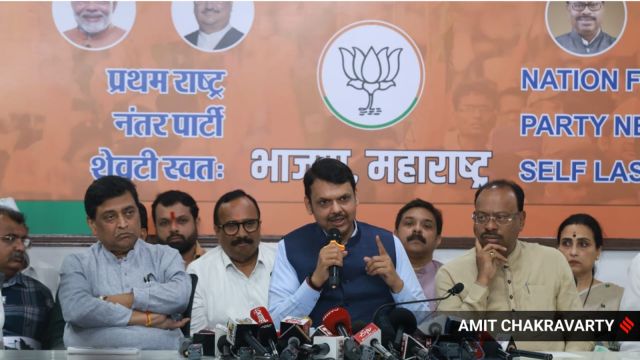Dynasts from ruling alliance face setback amid rise of Maharashtra Vikas Aghadi in Lok Sabha polls
BJP fielded most of the dynasts and saw seven of the 12 candidates lose, while Ajit Pawar-led NCP’s both dynastic nominees lost.
 Deputy Chief Minister Devendra Fadnavis at BJP HQ in Mumbai . (Express Photo by Amit Amit Chakravarty)
Deputy Chief Minister Devendra Fadnavis at BJP HQ in Mumbai . (Express Photo by Amit Amit Chakravarty)The swell in support for the Maharashtra Vikas Aghadi (MVA) in the Lok Sabha elections has dented the prospects of many political dynasts, particularly those fielded by the ruling BJP-NCP-Shiv Sena combine. Out of 32 dynasts fielded in the state, only 17 managed to win.
The hardest hit were dynasts from the ruling alliance. The BJP fielded 12 dynasts, of which only five won the elections. The Shiv Sena fielded six dynasts but only of them won. The Ajit Pawar-led NCP was the worst hit, with both of its dynasts losing the elections.
The MVA alliance, however, managed to do relatively well in facilitating the victory of candidates with political legacies. The Congress fielded five dynasts, all of whom won. The three dynasts fielded by the NCP Sharadchandra Pawar also won, while the Shiv Sena (UBT) saw two of its four dynasts win the elections.
In recent years, there has been a gradual delegitimisation of dynasticism by various political leaders, including Prime Minister Narendra Modi, who have often underscored the perils of dynastic politics and family-centric political parties. However, the attempt to maximise chances of winning seats has led to a high number of dynasts being fielded by all political parties in the state.
Of the 96 candidates fielded by the six prominent parties in the state, nearly 33 percent are political dynasts. The BJP fielded the highest number of dynasts at 12. Interestingly, among women candidates, 82 per cent of the 17 fielded had a political legacy.
Who is a political dynast?
A “dynast” is defined as any candidate or MP having a relative who has served or currently serves an elective mandate at any level of representation. It also includes candidates with relatives who serve or have served prominent positions in party organisations.
Political dynasties are a common feature in most of the world’s democracies. Arguments in favour of such dynasties include claims that they raise efficiency and create cohesiveness among legislators, which could improve the efficiency of functioning.
Hereditary politicians also argue that unlike other legacy professions such as law, medicine or the running of businesses, they have to submit themselves to the electoral test every five years.
The case against political dynasties is that they do not allow outsiders in easily, lead to the concentration of political power in a few families, and foster corruption. However, there is no empirical study to prove that hereditary politics leads to bad governance.
The main reason political parties field dynasts is to maximise their chances of winning seats, as being a dynast is more often an asset than a liability.







